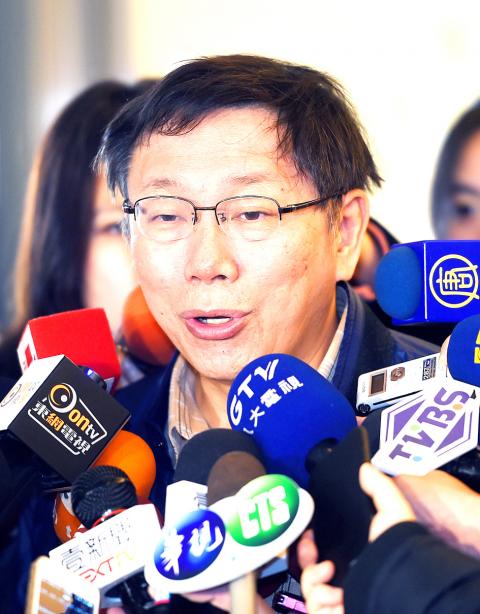Taipei Mayor Ko Wen-je (柯文哲) yesterday said his remarks made in a recent interview with Foreign Policy magazine were grossly misrepresented and asked that foreign reporters be more accurate when translating in the future.
In an online version of the interview published on Thursday, Ko was quoted as saying: “For the [world’s] four Chinese-speaking regions — Taiwan, Singapore, Hong Kong and Mainland China — the longer the colonization, the more advanced a place is.”
The reported statements have drawn flak from academics and legislators for overlooking the problems created by colonization.

Photo: Fang Pin-chao, Taipei Times
In response to reporters’ questions yesterday on the reactions to that statement, Ko said the idea he was trying to convey was that, with the rise of modern civilization, the longer a society comes into contact with a modern civilization, the more civilized it will become.
“How was that translated into: ‘The longer the colonization, the more advanced a place is.’ Good grief. They are miles apart,” Ko said on the sidelines of a book launch in Taipei that he attended.
Accurate translation should be ensured the next time foreign media outlets report, he said, adding that he would also reflect on how to answer questions more precisely.
Elaborating on his idea, Ko yesterday said that the rise of modern civilization was influenced by the Renaissance and began as Spain and Portugal discovered new sea routes around the globe. As such, the earlier a region is introduced to modern civilization, the more profound the influence, he said.
The main point of his remark was that a civilized society is not built overnight, Ko said.
“Habits such as stopping at red lights and going when the lights turn green and staying on the right side of the road take decades of education to foster,” he said.
He said that China, for example, was capable of boosting its GDP and developing nuclear energy in a short time, but the above habits that form part of a civilization in their subtle ways take a long time to enter the public consciousness.

US President Donald Trump yesterday announced sweeping "reciprocal tariffs" on US trading partners, including a 32 percent tax on goods from Taiwan that is set to take effect on Wednesday. At a Rose Garden event, Trump declared a 10 percent baseline tax on imports from all countries, with the White House saying it would take effect on Saturday. Countries with larger trade surpluses with the US would face higher duties beginning on Wednesday, including Taiwan (32 percent), China (34 percent), Japan (24 percent), South Korea (25 percent), Vietnam (46 percent) and Thailand (36 percent). Canada and Mexico, the two largest US trading

China's military today said it began joint army, navy and rocket force exercises around Taiwan to "serve as a stern warning and powerful deterrent against Taiwanese independence," calling President William Lai (賴清德) a "parasite." The exercises come after Lai called Beijing a "foreign hostile force" last month. More than 10 Chinese military ships approached close to Taiwan's 24 nautical mile (44.4km) contiguous zone this morning and Taiwan sent its own warships to respond, two senior Taiwanese officials said. Taiwan has not yet detected any live fire by the Chinese military so far, one of the officials said. The drills took place after US Secretary

CHIP EXCEPTION: An official said that an exception for Taiwanese semiconductors would have a limited effect, as most are packaged in third nations before being sold The Executive Yuan yesterday decried US President Donald Trump’s 32 percent tariff on Taiwanese goods announced hours earlier as “unfair,” saying it would lodge a representation with Washington. The Cabinet in a statement described the pledged US tariffs, expected to take effect on Wednesday next week, as “deeply unreasonable” and “highly regrettable.” Cabinet spokeswoman Michelle Lee (李慧芝) said that the government would “lodge a solemn representation” with the US Trade Representative and continue negotiating with Washington to “ensure the interests of our nation and industries.” Trump at a news conference in Washington on Wednesday announced a 10 percent baseline tariff on most goods

THUGGISH BEHAVIOR: Encouraging people to report independence supporters is another intimidation tactic that threatens cross-strait peace, the state department said China setting up an online system for reporting “Taiwanese independence” advocates is an “irresponsible and reprehensible” act, a US government spokesperson said on Friday. “China’s call for private individuals to report on alleged ‘persecution or suppression’ by supposed ‘Taiwan independence henchmen and accomplices’ is irresponsible and reprehensible,” an unnamed US Department of State spokesperson told the Central News Agency in an e-mail. The move is part of Beijing’s “intimidation campaign” against Taiwan and its supporters, and is “threatening free speech around the world, destabilizing the Indo-Pacific region, and deliberately eroding the cross-strait status quo,” the spokesperson said. The Chinese Communist Party’s “threats